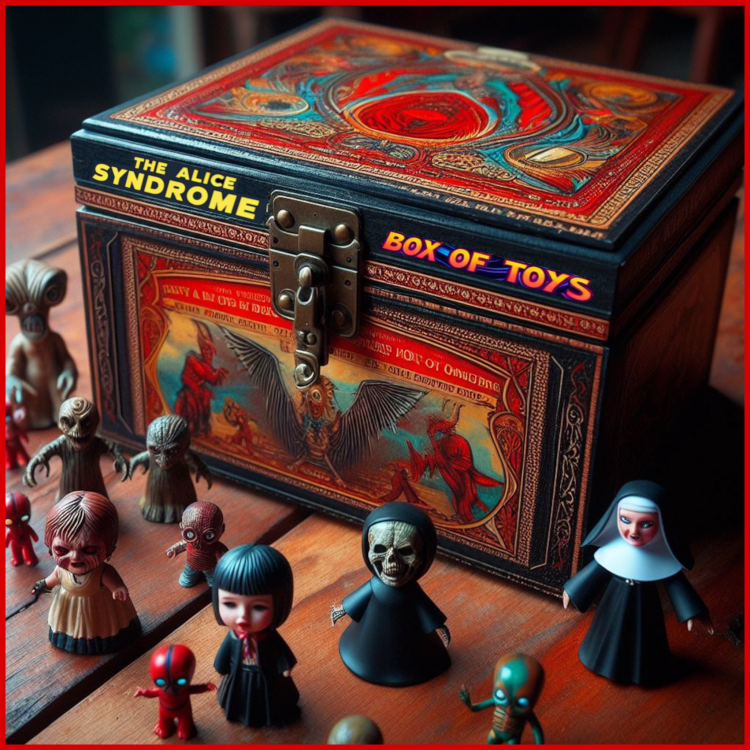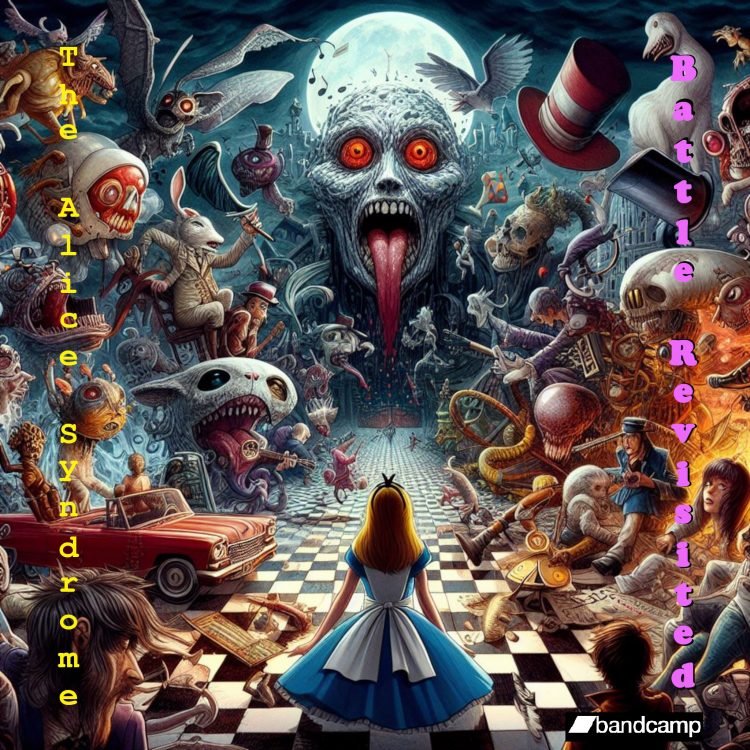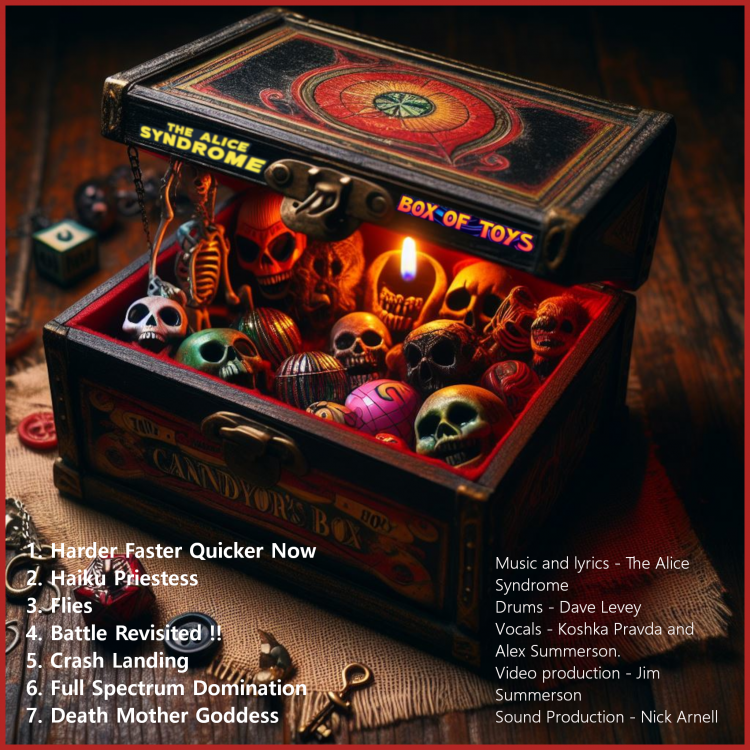Welcome to George’s blog. I play keyboards in the Alice Syndrome, and I’m also very interested in psychology, spirituality and self-transcendence. Groovhead tends to write all our lyrics, which always touch on subjects that hit deep into my interests.
Self-transcendence through music
One of the most rewarding experiences for a musician is to achieve a state of self-transcendence, which is the state of being beyond the limits of the ego and the self. Self-transcendence can be described as a feeling of connection with something greater than oneself, such as a higher power, nature, humanity, or the universe. Self-transcendence can also be experienced as a sense of harmony, joy, peace, and creativity (Maslow, 1971).
However, many musicians struggle with self-doubt, anxiety, perfectionism, and fear of failure, that prevent them from reaching this state. How can musicians overcome these barriers and access their true potential as artists? In this article, I will explore how some concepts from Rogerian psychology and parts-working therapy can help musicians achieve self-transcendence through music.
According to Carl Rogers, one of the founders of humanistic psychology, every person has a true self and a false self. The true self is the authentic and spontaneous expression of one’s personality, values, and desires.
The false self is the distorted and defensive image of oneself that is shaped by external influences, such as social expectations, cultural norms, and parental messages. The false self often acts as a mask that hides the true self from others and from oneself.
Rogers believed that the main goal of psychotherapy is to help clients discover and accept their true selves, and to live in harmony with their inner nature. He proposed three core conditions for facilitating this process: empathy, unconditional positive regard, and congruence. Empathy is the ability to understand and share the feelings of another person without judgment or evaluation. Unconditional positive regard is the acceptance and appreciation of another person, regardless of their flaws or mistakes. Congruence is the consistency and honesty between one’s thoughts, feelings, and actions.
How does this apply to musicians? We can think of musicians as having three aspects of their musical identity: the true musician, the false musician, and the ideal musician. The true musician is the expression of one’s musical talent, passion, and creativity. The false musician is the manifestation of one’s fears, insecurities, and self-criticism. The ideal musician is the representation of one’s goals, aspirations, and standards.
The false musician often interferes with the true musician by creating negative thoughts and feelings about one’s musical abilities and performance. For example, the false musician may say things like “I have to play like Hendrix”, “I have to be perfect”, “I have to impress everyone”, “I have to be original”, “I’m not good enough”, “I can’t play this piece”, “I will make mistakes”, “I will disappoint my audience”, or “I will be rejected”. These thoughts create anxiety, stress, and frustration that hinder the musical flow and enjoyment.
The false musician is not authentic, but rather tries to conform to what others want or think is good. The false musician is also disconnected from the true musician, which is the part of the self that is aligned with the core values, passions, and talents of the individual. The true musician is not concerned with pleasing others or achieving fame or recognition, but rather enjoys making music for its own sake and for the benefit of others. The true musician is also in touch with the flow of self, which is the source of inspiration, intuition, and creativity (Schwartz & Sweezy, 2019).
The key to achieving self-transcendence as a musician is to align the ideal musician with the true musician, and to reduce the influence of the false musician. This can be done by using parts-working techniques that help musicians identify, understand, and communicate with their different parts. Parts-working is a form of therapy that views each person as a system of subpersonalities or parts that have their own feelings, thoughts, beliefs, and motivations. Parts-working helps clients integrate their parts into a coherent whole that supports their wellbeing and growth.
One way that musicians can overcome the false musician and access the true musician is by using parts-working concepts. This is a therapeutic approach that helps individuals identify and understand the different parts of their selves that have different needs, feelings, and goals. Parts-working also helps individuals communicate with their parts in a loving, supportive, and empathic way, and integrate them into a coherent and harmonious whole. Parts-working assumes that every part has a positive intention and a valuable role to play in the self-system (Schwartz & Sweezy, 2019).
One of the most common parts-working methods is called Internal Family Systems (IFS), developed by Richard Schwartz. IFS assumes that each person has a core self that is compassionate, curious, calm, and confident. The core self is the essence of who we are as human beings. IFS also assumes that each person has three types of parts: exiles, managers, and firefighters (Schwartz & Sweezy, 2019).
By applying parts-working to their musical practice, musicians can learn to recognize and appreciate their false musician parts, such as the critic, the perfectionist, the impostor, or the pleaser. These parts may have developed as a way of coping with past traumas, rejections, or failures, or as a way of seeking approval, validation, or acceptance from others.
However, these parts may also hinder the musical expression and development of the true musician by imposing unrealistic standards, creating anxiety and stress, or suppressing originality and spontaneity. By listening to these parts with curiosity and compassion, musicians can understand their underlying needs and fears, and negotiate with them to find a balance between striving for excellence and enjoying the process. Musicians can also invite these parts to join them in making music from a place of curiosity and experimentation rather than judgment and evaluation (Schwartz & Sweezy, 2019).
Musicians can also use parts-working to connect with their true musician parts, such as the artist, the innovator, the performer, or the collaborator. These parts are expressions of the true self, which is the essence of who they are as musicians. The true self is characterized by qualities such as confidence,
creativity, compassion, and courage.
The true self is also connected to the flow of self, which is the source of musical inspiration, intuition, and improvisation. By accessing the flow of self, musicians can transcend their ego and their self-consciousness, and become one with the music and the moment. By embracing their true musician parts, musicians can express their authentic voice and vision through music, and share their gifts and talents with others (Schwartz & Sweezy, 2019).
In addition, musicians can achieve self-transcendence is by forming bands that are based on Rogerian principles. As previously mentioned, Rogers (1951) proposed that there are three core conditions for facilitating personal growth and change: empathy, congruence, and unconditional positive regard. By applying these principles to their band interactions, musicians can create a safe, supportive, and stimulating environment for themselves and their bandmates.
They can listen to each other with empathy, express themselves with congruence, and respect each other with unconditional positive regard. They can also give and receive constructive feedback, encourage each other’s strengths and potentials, and celebrate each other’s achievements and contributions. By doing so, they can foster a sense of trust, cohesion, and belonging among themselves, and enhance their musical performance and creativity as a group. They can also experience self-transcendence as a band, by feeling connected to each other, to their audience, and to their musical purpose and mission (Rogers,
1951).
Many musicians have experienced transcendence through music. Music can be a powerful tool for accessing higher levels of consciousness, creativity, and spirituality. Here are some quotes and examples from famous musicians who have shared their transcendent experiences with music.
“My music fights against the system that teaches to live and die.” – Bob Marley (100 Music Quotes From The Best Musicians In The World, n.d.)
Marley was a reggae icon who used his music to challenge the oppression and injustice in his society. He also used his music to express his Rastafarian faith and his hope for a better world. He saw music as a weapon of resistance and liberation.
“Music comes from a place we don’t know.” – Chris Martin (100 Music Quotes From The Best Musicians In The World, n.d.)
Martin is the lead singer of Coldplay, a popular rock band that has created many hit songs with catchy melodies and meaningful lyrics. He admitted that he did not know where his musical inspiration came from, but he trusted his intuition and creativity.
“Music is the strongest form of magic.” – Marilyn Manson (100 Music Quotes From The Best Musicians In The World, n.d.)
Manson is a controversial rock star who has shocked and provoked audiences with his dark and provocative music and image. He claimed that music had the power to influence people’s emotions, thoughts, and actions in ways that other forms of art could not.
These are just some examples of musicians who have experienced transcendence through music. They show that music can be a source of joy, beauty, wisdom, rebellion, mystery, and magic for both the musicians and the listeners.
References
Maslow, A. H. (1971). The farther reaches of human nature. New York, NY: Viking Press.
Rogers, C. R. (1951). Client-centered therapy: Its current practice, implications and theory. London, UK: Constable.
Schwartz, R. C., & Sweezy, M. (2019). Internal family systems therapy (2nd ed.). New York, NY: Guilford Press.
The Power of Music: 30 Quotes from Famous Musicians. (2023). Retrieved from https://www.discoverwalks.com/blog/world/the-power-of-music-30-quotes-from-famous-musicians/
100 Music Quotes From The Best Musicians In The World. (n.d.). Retrieved from https://wisdomquotes.com/music-quotes/

































































2 comments
Mint! Excellent article George!
Wow that was a read and a half. Mind expanding and thoughtful x